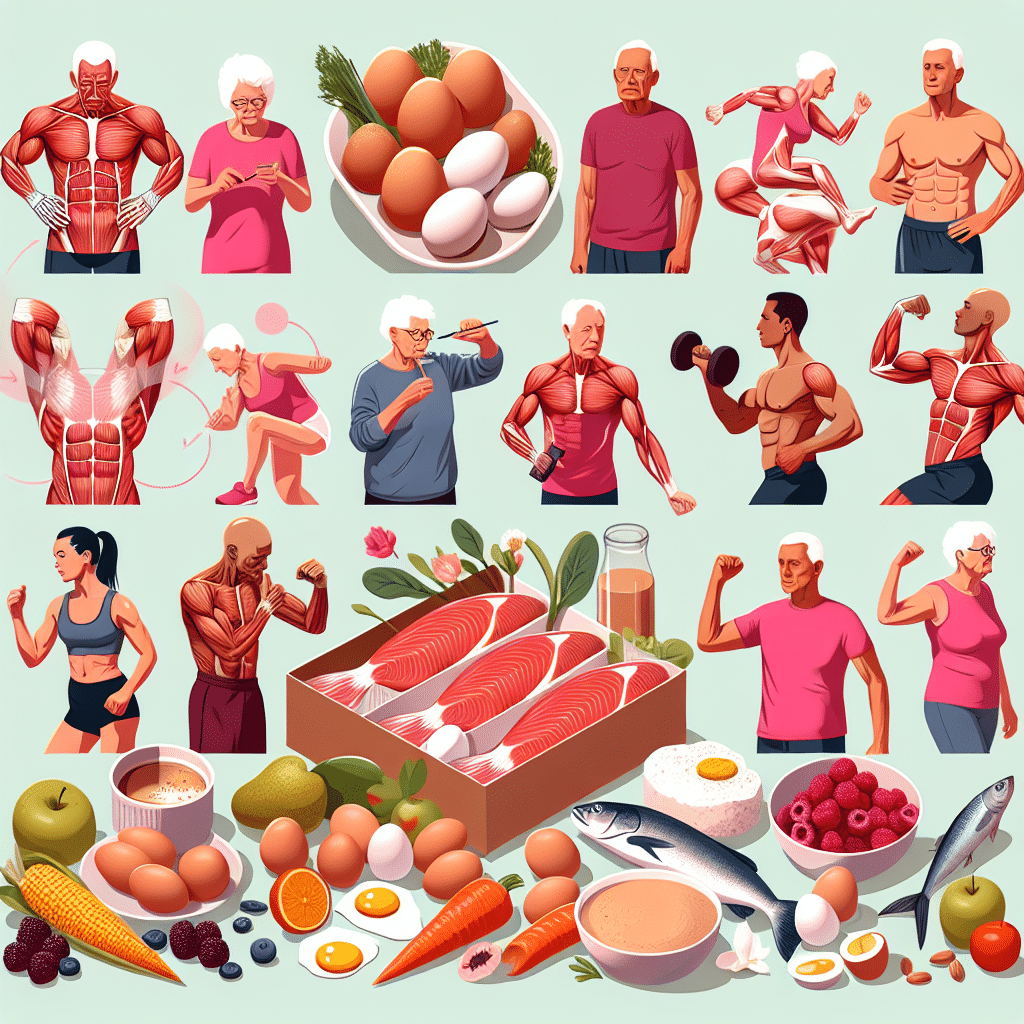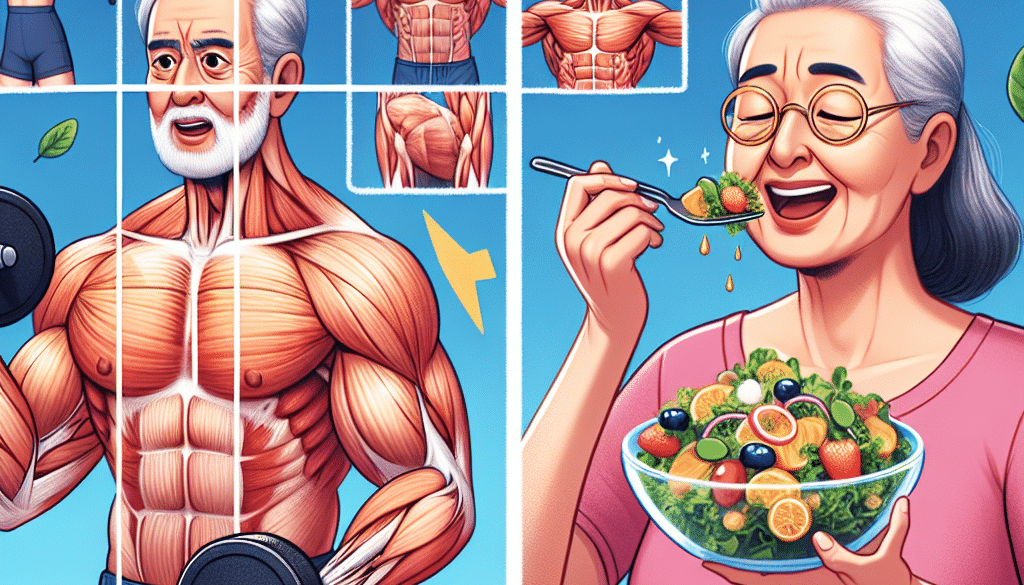Muscle Ageing-Nutrition Interventions During Adulthood
-
Table of Contents
- Muscle Ageing and Nutrition: Effective Interventions During Adulthood
- Understanding Muscle Ageing
- The Role of Nutrition in Muscle Health
- Protein Intake
- Omega-3 Fatty Acids
- Vitamin D and Calcium
- Antioxidants
- Practical Dietary Strategies for Muscle Preservation
- Case Studies and Statistics
- Conclusion: Key Takeaways for Maintaining Muscle Health
- ETChem’s Protein Products: Aiding Muscle Health
Muscle Ageing and Nutrition: Effective Interventions During Adulthood

As we age, our bodies undergo a myriad of changes, one of the most significant being the natural decline of muscle mass and function, a condition known as sarcopenia. This process can lead to decreased strength, mobility issues, and a lower quality of life. However, nutrition plays a pivotal role in mitigating the effects of muscle ageing. In this article, we will explore the various nutritional interventions that can help maintain muscle health during adulthood.
Understanding Muscle Ageing
Muscle ageing is a complex process influenced by genetic, lifestyle, and environmental factors. After the age of 30, adults can lose 3-8% of their muscle mass per decade, and this rate accelerates after the age of 60. The consequences of muscle ageing are not just cosmetic; they can lead to increased frailty, a higher risk of falls and fractures, and a loss of independence.
The Role of Nutrition in Muscle Health
Nutrition is one of the most controllable factors in the fight against muscle ageing. A diet rich in certain nutrients can help preserve muscle mass and strength. Here are some key nutritional interventions:
Protein Intake
Protein is the building block of muscle tissue. Adequate protein intake is essential for muscle repair and growth. Adults should aim for at least 1.2 to 1.5 grams of protein per kilogram of body weight per day, with an emphasis on high-quality sources such as lean meats, dairy, eggs, and plant-based options like legumes and soy.
Omega-3 Fatty Acids
Omega-3 fatty acids, found in fatty fish, flaxseeds, and walnuts, have anti-inflammatory properties that may help combat muscle loss. Studies suggest that omega-3 supplementation can improve muscle function and quality in older adults.
Vitamin D and Calcium
These nutrients are vital for bone health, which is closely linked to muscle function. Vitamin D deficiency is common in older adults and can exacerbate muscle weakness. Dairy products, fortified foods, and sunlight exposure can help maintain adequate levels.
Antioxidants
Antioxidants such as vitamins C and E, selenium, and carotenoids help protect muscle cells from damage caused by free radicals. A diet rich in fruits, vegetables, nuts, and seeds can provide these essential nutrients.
Practical Dietary Strategies for Muscle Preservation
Implementing the following dietary strategies can help adults maintain muscle mass and function:
- Spread protein intake evenly throughout the day to maximize muscle protein synthesis.
- Incorporate strength-training exercises to complement the effects of a protein-rich diet.
- Choose nutrient-dense foods that provide a variety of vitamins and minerals.
- Stay hydrated, as dehydration can negatively impact muscle performance.
- Consider supplementation under the guidance of a healthcare professional if dietary intake is insufficient.
Case Studies and Statistics
Research has consistently shown the benefits of nutritional interventions on muscle health. For example, a study published in the American Journal of Clinical Nutrition found that older adults who consumed higher amounts of protein had significantly less muscle loss over a three-year period. Additionally, omega-3 supplementation has been linked to improved muscle strength and physical function in several clinical trials.
Conclusion: Key Takeaways for Maintaining Muscle Health
Maintaining muscle health during adulthood is crucial for overall well-being and independence. A balanced diet rich in protein, omega-3 fatty acids, vitamins, and minerals, combined with regular physical activity, can significantly slow down the muscle ageing process. By adopting these nutritional interventions, adults can enhance their quality of life and reduce the risk of age-related muscle decline.
ETChem’s Protein Products: Aiding Muscle Health
For those looking to supplement their diet with high-quality protein, ETChem’s range of collagen products can be an excellent addition. Their products, sourced from various origins like marine, fish, bovine, and chicken, provide a spectrum of collagen types that are beneficial for muscle health. With a focus on purity and solubility, ETChem’s collagens are ideal for incorporation into a muscle-preserving dietary regimen.
About ETChem:
ETChem, a reputable Chinese Collagen factory manufacturer and supplier, is renowned for producing, stocking, exporting, and delivering the highest quality collagens. They include marine collagen, fish collagen, bovine collagen, chicken collagen, type I collagen, type II collagen and type III collagen etc. Their offerings, characterized by a neutral taste, instant solubility attributes, cater to a diverse range of industries. They serve nutraceutical, pharmaceutical, cosmeceutical, veterinary, as well as food and beverage finished product distributors, traders, and manufacturers across Europe, USA, Canada, Australia, Thailand, Japan, Korea, Brazil, and Chile, among others.
ETChem specialization includes exporting and delivering tailor-made collagen powder and finished collagen nutritional supplements. Their extensive product range covers sectors like Food and Beverage, Sports Nutrition, Weight Management, Dietary Supplements, Health and Wellness Products, ensuring comprehensive solutions to meet all your protein needs.
As a trusted company by leading global food and beverage brands and Fortune 500 companies, ETChem reinforces China’s reputation in the global arena. For more information or to sample their products, please contact them and email karen(at)et-chem.com today.




